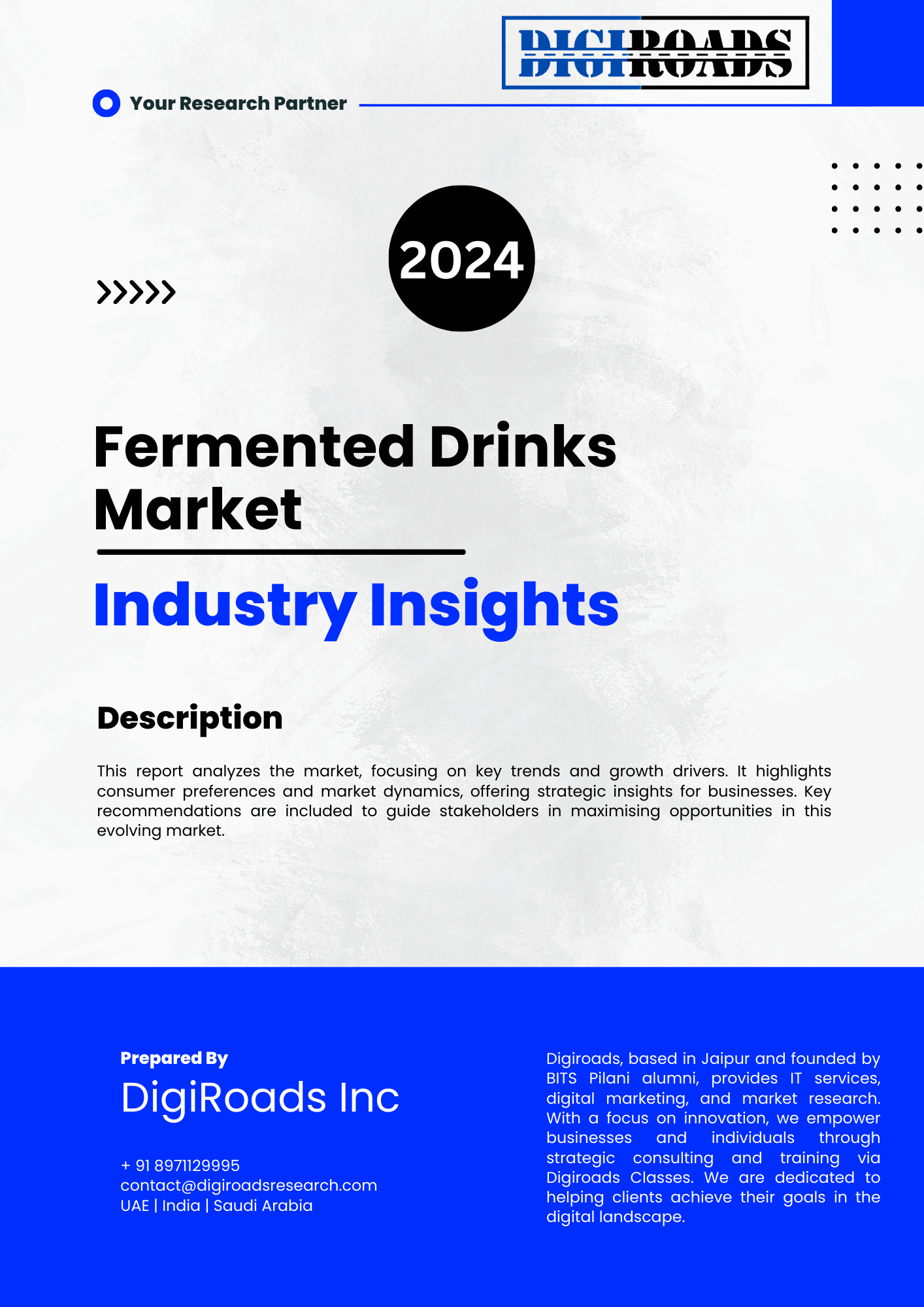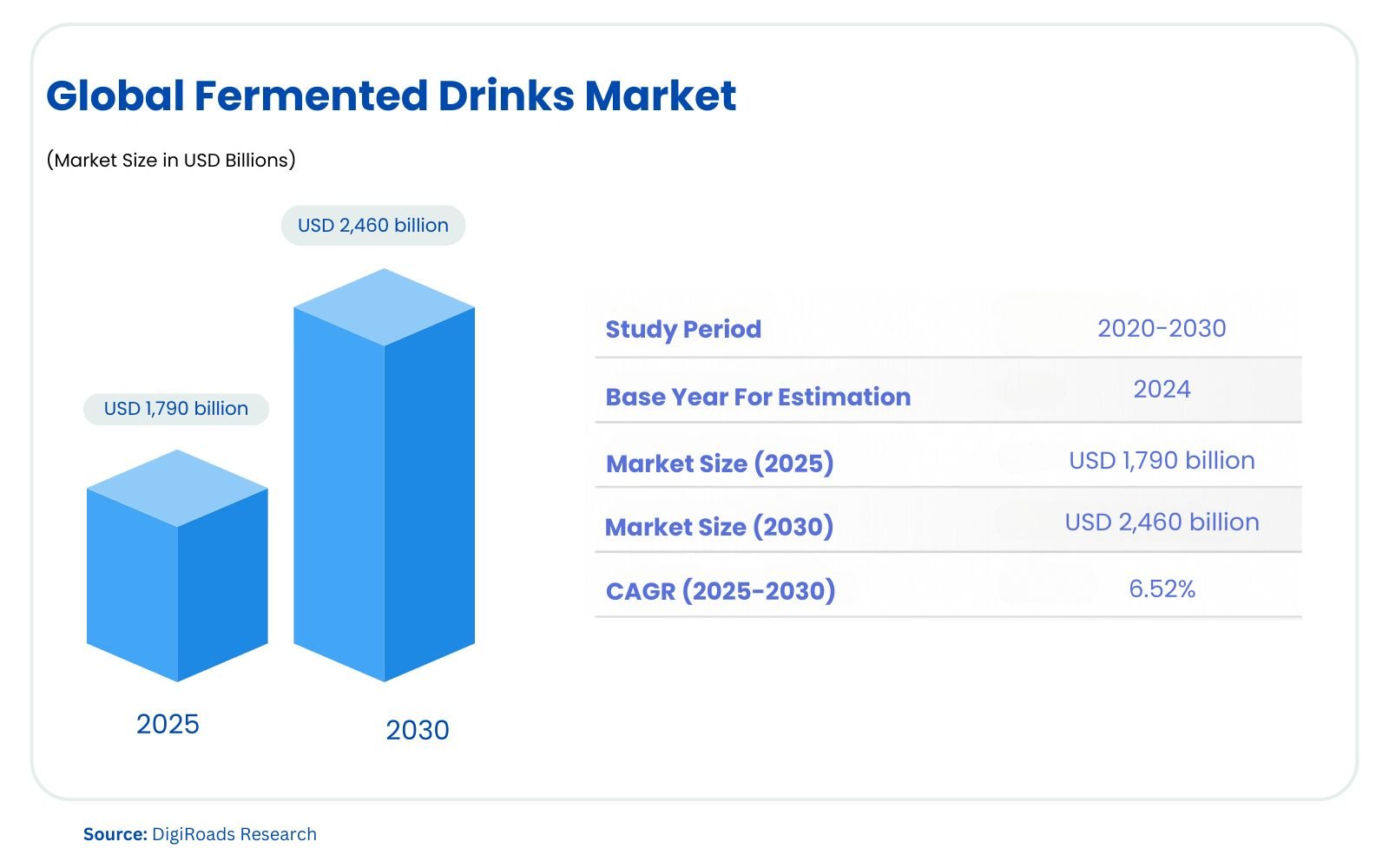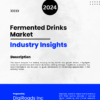Global Fermented Drinks Market
- Brand: DigiRoads
Discover the 100+ page report on the Global Fermented Drinks Market, providing insights into trends, growth drivers, and the competitive landscape. Available in PDF and Excel formats for easy access to detailed data and analysis.
Global Fermented Drinks Market Report | Market Size, Industry Analysis, Growth Opportunities, & Forecast (2025-2030)
Global Fermented Drinks Market Overview
The global Fermented Drinks Market is expected to reach a market size of USD 1,790 billion in 2025 and is projected to grow to USD 2,460 billion by 2030, expanding at a robust CAGR of 6.52% during the forecast period 2025-2030. The global fermented drinks market is poised for robust growth between 2025 and 2030, driven by increasing consumer awareness about the xhealth benefits associated with fermented beverages. Products like kombucha, kefir, and yogurt-based drinks are gaining popularity due to their probiotic content, which supports gut health and boosts immunity. Rising demand for natural, organic, and functional beverages among health-conscious consumers further fuels market expansion.
North America and Europe lead the market due to high consumption of functional foods and beverages. Meanwhile, the Asia-Pacific region is emerging as a lucrative market, driven by traditional fermented drink consumption and growing urbanization. Innovation in flavors, sustainable packaging, and the introduction of non-dairy alternatives are key trends shaping the market.
E-commerce channels and health-focused marketing strategies are amplifying product reach, enhancing consumer engagement. However, challenges such as regulatory compliance and high production costs may hinder growth.
This report provides a comprehensive analysis of market dynamics, key players, regional insights, and emerging opportunities, offering a detailed forecast for the years 2025 to 2030. Marketers, manufacturers, and stakeholders can leverage this data to align with consumer preferences and capitalize on growth opportunities.
Market Report Coverage:
The “Global Fermented Drinks Market Report—Future (2025-2030)” by Digiroads Research & Consulting covers an in-depth analysis of the following segments in the market.
| Product Type | Kombucha, Kefir, Yogurt-Based Drinks, Probiotic Drinks, Other Fermented Beverages |
| Distribution | Supermarkets/Hypermarkets, Convenience Stores, Specialty Stores, Online Retail |
| By Region | North America, Europe, Asia-Pacific, Latin America, Middle East & Africa |
Study Assumptions and Definitions
This report on the global fermented drinks market from 2025 to 2030 is based on several assumptions regarding market dynamics, growth drivers, and key trends. It assumes that the increasing demand for functional and probiotic beverages will continue to drive market growth. Consumer preferences for healthier, organic, and plant-based alternatives are expected to persist, contributing to the expansion of plant-based fermented drinks. Moreover, the ongoing adoption of e-commerce platforms and online retail will facilitate broader product distribution globally.
Key definitions used in this study include:
- Fermented Drinks: Beverages produced through the fermentation process, which includes products like kombucha, kefir, yogurt-based drinks, and other probiotic beverages.
- Probiotics: Live microorganisms that provide health benefits, particularly for digestive and immune health.
- Plant-Based Drinks: Beverages made from non-dairy ingredients such as soy, almond, oat, or coconut.
- Functional Beverages: Drinks that offer health benefits beyond basic nutrition, including those that improve digestion, boost immunity, or enhance mental clarity.
The market is analyzed across different product types, regions, and distribution channels to provide insights into growth opportunities and potential challenges during the forecast period. The scope of the report also includes market trends, technological advancements, and consumer behavior shifts that will shape the market until 2030.
Market Scope
This report provides a comprehensive analysis of the global fermented drinks market from 2025 to 2030, covering key market trends, growth drivers, challenges, and opportunities. The scope includes a detailed examination of the market across various product types, such as kombucha, kefir, yogurt-based drinks, and other probiotic beverages, with a focus on consumer preferences for functional and health-promoting drinks.
The report analyzes market dynamics in key regions, including North America, Europe, Asia-Pacific, Latin America, and the Middle East & Africa, highlighting regional growth trends and consumer behavior. It also covers the impact of e-commerce, packaging innovations, and the growing demand for plant-based and organic products.
The study offers insights into market segmentation by product type, ingredient, distribution channel, and packaging. The report further evaluates the competitive landscape, providing an overview of key players and their strategies, and offers projections for market growth through 2030, assisting stakeholders in decision-making.
MARKET OUTLOOK
Executive Summary
The global fermented drinks market is expected to experience significant growth from 2025 to 2030, driven by increasing consumer awareness of the health benefits associated with probiotic-rich beverages. As consumers become more health-conscious, the demand for functional drinks such as kombucha, kefir, and yogurt-based beverages is rising. These products, known for their digestive and immune-boosting properties, are gaining traction in both developed and emerging markets.
Key market drivers include the growing preference for natural and organic ingredients, the rise of plant-based diets, and the increasing popularity of functional beverages that provide more than basic hydration. Fermented drinks, with their probiotic benefits, are seen as an essential part of a healthy lifestyle, further bolstered by the expanding wellness trend. Innovation in flavors, packaging, and product formulations is also expected to fuel market expansion, with consumers showing interest in variety and customization.
North America and Europe are the dominant regions in the fermented drinks market, supported by established consumption patterns and high demand for health-centric products. However, the Asia-Pacific region is emerging as a lucrative market due to the popularity of traditional fermented beverages, such as kombucha and kefir, and rising urbanization. The Middle East and Latin America are also witnessing growing demand for these drinks, as awareness of their health benefits increases.
Challenges such as high production costs, regulatory constraints, and competition from other functional beverages may impact market growth. Nevertheless, opportunities remain in the form of innovative product development, particularly in the plant-based sector, and the continued growth of online retail channels, which are enhancing product accessibility globally.
The global fermented drinks market is poised for significant expansion from 2025 to 2030, with key players leveraging these trends to capture emerging market opportunities.
COMPETITIVE LANDSCAPE
The Global Fermented Drinks Market is moderately fragmented, with regional and multinational players competing fiercely for market share.
Key Market Players
- GT’s Living Foods
- Kerry Group
- Danone S.A.
- Yakult Honsha Co., Ltd.
- The Hain Celestial Group
- Health-Ade Kombucha
- KeVita (PepsiCo)
- Red Bull GmbH
- Nestlé S.A.
Market Share Analysis
The global fermented drinks market is highly competitive, with several key players holding significant shares. As of the forecast period from 2025 to 2030, major companies like GT’s Living Foods, Danone S.A., and Yakult Honsha Co., Ltd. dominate the market, driven by their established brand presence and extensive product offerings, including kombucha, kefir, and yogurt-based drinks. These companies are expected to maintain strong market shares due to their robust distribution networks and consumer loyalty.
The Asia-Pacific region, particularly countries like Japan and South Korea, holds a significant portion of the market, driven by the traditional consumption of fermented beverages like kombucha and kefir. Kerry Group and The Hain Celestial Group are also expected to grow their market share, focusing on organic and plant-based fermented drinks as consumer preferences shift towards healthier, dairy-free alternatives.
E-commerce and online retail channels are increasingly contributing to the growth of smaller and newer brands, which are carving out a niche in the market by offering innovative flavors and health benefits. Brands such as Health-Ade Kombucha and KeVita (PepsiCo) are expected to capture a larger share due to the increasing demand for functional drinks and convenience-driven online shopping.
Despite challenges like regulatory constraints and production costs, the overall market share for fermented drinks is set to expand, with key players continuously innovating to meet evolving consumer demands.
MARKET DYNAMICS
Market Drivers and Key Innovations
The global fermented drinks market is poised for substantial growth from 2025 to 2030, driven by several key factors. One of the primary market drivers is the growing consumer preference for health-conscious, functional beverages. Fermented drinks, rich in probiotics, are recognized for their digestive and immune-boosting benefits, making them an integral part of wellness-focused diets. As more consumers seek products that contribute to overall well-being, the demand for these drinks continues to rise.
The increasing shift towards plant-based diets is another major driver, as consumers opt for dairy-free and vegan-friendly alternatives. This trend has spurred innovation in plant-based fermented drinks, including kombucha, kefir, and yogurt-based beverages made from soy, almond, and coconut milk. Additionally, the rising awareness of gut health and the positive impact of probiotics on digestion further boosts market demand.
Key innovations in the market include advancements in flavor profiles, with manufacturers experimenting with new and exotic ingredients to meet diverse consumer tastes. There is also an increasing focus on sustainable packaging solutions, such as eco-friendly bottles and cans, to cater to the growing demand for environmentally responsible products. Furthermore, brands are increasingly incorporating functional ingredients like adaptogens, vitamins, and minerals into fermented drinks to offer enhanced health benefits.
The rise of e-commerce and online retail channels also plays a significant role in expanding the reach of fermented drinks, allowing consumers to access a wide variety of products conveniently. As health trends evolve, key players in the market are expected to continue driving innovation to meet changing consumer preferences.
Market Challenges
- Competition from OTT Platforms: High Production Costs: The production of fermented drinks, particularly premium and organic varieties, can be costly due to the complex fermentation processes and sourcing of quality ingredients. This can lead to higher product prices, limiting consumer access.
- Regulatory Compliance: The fermented drinks market is subject to stringent food safety and health regulations across different regions. Compliance with varying standards and regulations can increase operational costs and delay product launches.
- Competition from Other Functional Beverages: The rise of alternative functional beverages, such as protein drinks, energy drinks, and ready-to-drink teas, poses significant competition to fermented drinks, potentially diverting consumer interest.
- Limited Consumer Awareness: Despite growing interest in health-conscious beverages, there remains a lack of awareness among certain consumer segments regarding the health benefits of fermented drinks, which can hinder market growth.
- Flavor Preferences and Taste Variability: While innovations in flavor are increasing, fermented drinks may not appeal to all consumers due to their unique taste profiles. This can limit their widespread adoption, especially in regions where the concept of fermented beverages is not as familiar.
- Supply Chain and Distribution Challenges: Efficiently scaling up production and distribution, especially in emerging markets, can be challenging due to logistical issues, refrigeration requirements, and transportation costs, which may hinder market penetration.
- Short Shelf Life: Many fermented drinks have a shorter shelf life compared to other beverages, leading to inventory management challenges and potential waste, especially in global markets.
Market Opportunities
- Immersive Technologies: Growing Health Consciousness: Increasing consumer awareness about the health benefits of probiotics and functional beverages presents an opportunity for market expansion. Fermented drinks, known for their digestive and immune-boosting properties, can tap into the health and wellness trend.
- Rising Demand for Plant-based Alternatives: The growing shift towards plant-based and vegan diets offers opportunities for innovation in plant-based fermented drinks, such as soy, almond, and oat-based kefir and kombucha, catering to the expanding market for dairy-free options.
- E-Commerce Growth: The rise of online shopping offers an opportunity for fermented drink brands to reach a wider consumer base. E-commerce platforms enable direct-to-consumer sales, facilitating access to niche and premium products.
- Flavored and Customizable Products: Innovations in flavor combinations and the introduction of customizable options, such as limited-edition flavors and functional ingredients (vitamins, adaptogens, etc.), can attract a broader audience and keep consumers engaged.
- Sustainability and Eco-Friendly Packaging: Growing consumer demand for sustainable and eco-friendly products presents an opportunity to innovate in packaging. Fermented drink brands can explore recyclable, biodegradable, or reusable packaging options to appeal to environmentally conscious consumers.
- Expansion into Emerging Markets: With rising disposable incomes and growing interest in healthy beverages, there is significant growth potential in emerging markets, especially in Asia-Pacific, Latin America, and Africa, where fermented beverages are gaining popularity.
- Collaborations and Strategic Partnerships: Collaborations between established beverage companies and emerging brands can facilitate access to new markets, strengthen product offerings, and enhance brand visibility in competitive markets.
RECENT STRATEGIES & DEVELOPMENTS IN THE MARKET
Product Innovation & Diversification:
- Companies like GT’s Living Foods and Health-Ade Kombucha have introduced new flavors and variants of kombucha, such as turmeric and elderberry, to attract a broader consumer base.
- KeVita (PepsiCo) launched new probiotic drink lines, incorporating functional ingredients like adaptogens and added vitamins, targeting wellness-focused consumers.
Sustainability Initiatives:
- Danone S.A. has committed to reducing its carbon footprint and achieving full sustainability in its packaging by 2025. They aim to increase the use of recyclable materials in their products, including fermented drink lines like Activia.
- Kerry Group has adopted environmentally friendly packaging for their fermented beverage products, using 100% recyclable bottles.
Strategic Acquisitions & Partnerships:
- PepsiCo acquired KeVita in 2020, expanding its portfolio of fermented drinks. This acquisition helped PepsiCo strengthen its position in the growing kombucha and functional beverage market.
- Molson Coors Beverage Company expanded into the non-alcoholic fermented drinks space by acquiring Revel Stoke, a probiotic beverage brand, to diversify its offerings.
Geographical Expansion:
- Yakult Honsha Co., Ltd. expanded its market presence in Europe and the Middle East, increasing its distribution of probiotic beverages to cater to the rising health trends in these regions.
- The Hain Celestial Group increased its market share in Asia-Pacific by launching organic and plant-based fermented drinks, capitalizing on growing health awareness in the region.
Focus on Plant-Based Products:
- Kerry Group launched plant-based kefir alternatives to tap into the increasing demand for dairy-free, probiotic-rich beverages.
- Danone introduced a line of dairy-free probiotic drinks made from almond and coconut milk, catering to the plant-based and vegan consumer segments.
Increased Online Retail Presence:
- Many brands, including Health-Ade and GT’s Living Foods, have significantly increased their e-commerce presence, leveraging direct-to-consumer platforms to expand their reach and respond to the growing trend of online shopping for health products.
- KeVita launched an exclusive online-only range of probiotic drinks to capitalize on the demand for unique and limited-edition products in the digital marketplace.
KEY BENEFITS FOR STAKEHOLDERS
- Increased Market Growth Opportunities:
Stakeholders, including manufacturers, investors, and distributors, can benefit from the expanding demand for health-conscious, functional beverages. As consumers increasingly prioritize gut health and wellness, there are significant growth opportunities within the fermented drinks sector. - Innovation-Driven Profits:
Companies focusing on product innovation, such as new flavors, plant-based options, and functional ingredients, can capture consumer attention and loyalty, leading to increased revenue streams. This is particularly beneficial for businesses looking to differentiate themselves in a competitive market. - Access to Emerging Markets:
Stakeholders can capitalize on the growing popularity of fermented drinks in emerging markets, particularly in regions like Asia-Pacific, Latin America, and the Middle East. As awareness of probiotics and fermented products increases, businesses have the opportunity to expand their reach and grow their market share. - Sustainability and Brand Loyalty:
Emphasizing sustainability and eco-friendly packaging can enhance a company’s brand image and consumer loyalty. Stakeholders focused on sustainability can attract environmentally conscious consumers, increasing long-term market positioning and profitability. - E-commerce Growth:
The rise of e-commerce and direct-to-consumer sales provides stakeholders with an efficient way to reach a broader customer base. Online platforms enable access to niche markets and emerging trends, enhancing distribution capabilities and driving sales. - Health and Wellness Trend Alignment:
Investors and manufacturers aligned with the health and wellness trends of fermented drinks can benefit from increasing consumer spending on probiotic-rich, functional beverages. As consumers look for products that offer health benefits, businesses can tailor their offerings to meet these growing demands. - Partnership and Acquisition Potential:
Strategic partnerships and acquisitions offer stakeholders opportunities for increased market share, better supply chain integration, and access to new product innovations. Collaboration with established brands or emerging players can help stakeholders strengthen their position in the market.
At DigiRoads Research, we emphasize reliability by employing robust market estimation and data validation methodologies. Our insights are further enhanced by our proprietary data forecasting model, which projects market growth trends up to 2030. This forward-thinking approach ensures our analysis not only captures the current market landscape but also anticipates future developments, equipping stakeholders with actionable foresight.
We go a step further by offering an exhaustive set of regional and country-level data points, supplemented by over 60 detailed charts at no additional cost. This commitment to transparency and accessibility allows stakeholders to gain a deep understanding of the industry’s structural and operational dynamics. By providing exclusive and hard-to-access data, DigiRoads Research empowers businesses to make informed strategic decisions with confidence.
In essence, our methodology and data delivery foster a collaborative and data-driven decision-making environment, enabling businesses to navigate industry challenges and capitalize on opportunities effectively.
Contact Us For More Inquiry.
Table of Contents
-
INTRODUCTION
- Market Overview
- Years Considered for Study
- Market Segmentation
- Study Assumptions and Definitions
- Market Scope
-
RESEARCH METHODOLOGY
-
MARKET OUTLOOK
- Executive Summary
- Market Snapshot
- Market Segments
- Product Type:
- Kombucha, Kefir, Yogurt-Based Drinks, Probiotic Drinks, Other Fermented Beverages
- Distribution:
- Supermarkets/Hypermarkets, Convenience Stores, Specialty Stores, Online Retail
- By Region:
- North America, Europe, Asia-Pacific, Latin America, Middle East & Africa
- Product Type:
-
COMPETITIVE LANDSCAPE
- Recent Strategies (Key Strategic Moves)
- Market Share Analysis
- Company Profiles
- GT’s Living Foods
- Kerry Group
- Danone S.A.
- Yakult Honsha Co., Ltd.
- The Hain Celestial Group
- Health-Ade Kombucha
- KeVita (PepsiCo)
- Red Bull GmbH
- Nestlé S.A.
-
MARKET DYNAMICS
- Market Drivers
- Market Challenges
- Market Opportunities
- Porter’s Five Forces’ Analysis
- Bargaining Power of Suppliers
- Bargaining Power of Buyers
- Threat of New Entrant
- Threat of Substitutes
- Competitive Rivalry
-
GLOSSARY OF PROMINENT SECONDARY SOURCES
-
DISCLAIMER
-
ABOUT US



